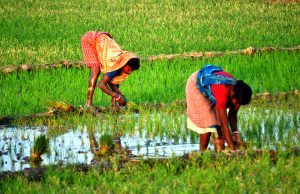India’s economy is projected to grow 8 percent to 8.5 percent in the financial year beginning April 1, signaling a strong recovery after it was slammed by the COVID-19 pandemic.
The government’s annual economic survey, released Monday, comes a day before Finance Minister Nirmala Sitharaman is due to present the national budget for the 2022-23 fiscal year.
The survey also forecast that India’s economy will expand at a 9.2 percent annual pace in the current financial year. That would make Asia’s third-largest economy one of the fastest growing major economies after it suffered a 7.3 percent contraction the year before, its worst performance in 40 years.
Almost all indicators show that the economic impact of the COVID-19 surge last year, driven by the Delta variant, was “much smaller than that experienced during the full lockdown phase in 2020-21 even though the health impact was more severe,” the report said.
Agriculture did best, followed by industries including manufacturing, mining and construction.
The economy grew at an 8.4 percent annual pace in the July-September quarter after contracting by over 7 percent in the same quarter the year before.
Activity was supported by rising vaccination rates, which helped instill confidence in reopening businesses, and pent-up demand after months of restrictions and varying shutdowns. Over half of India’s nearly 1.4 billion population is fully vaccinated, with about 20 percent still awaiting their second shots. Some vulnerable groups began getting booster shots in January, but there has been no official word yet on boosters for the wider population.
New coronavirus infections have jumped due to the omicron variant of the virus, though health officials said last week there signs they may be plateauing in some areas. They warned that cases were still surging some other states. In the capital, New Delhi, pandemic restrictions have been relaxed to allow restaurants, bars, and movie theaters to operate at half capacity.
Experts have warned that as states relax restrictions, infections could start rising again. And even though the economy has picked up, multiple waves of outbreaks have battered the country’s large informal sector and contact-intensive services like restaurants, hotels, retailing and tourism.
Unemployment rose to nearly 8 percent in December, a four-month high, according to data from the think tank Center for Monitoring Indian Economy.
The survey says that the agriculture sector will grow by 3.9 percent in 2021-22 while the industrial and service sectors will see 11.8 percent and 8.2 percent growth, respectively. Meanwhile, India’s total exports are expected to grow by 16.5 percent in 2021-22 surpassing pre-pandemic levels, while imports are likely to grow by 29.4 percent in this period.
According to noted economist and former Reserve Bank of India Governor Raghuram Rajan, the Indian economy has “some bright spots and a number of very dark stains”
“The bright spots are the health of large firms, the roaring business the IT and IT-enabled sectors are doing, including the emergence of unicorns in a number of areas, and the strength of some parts of the financial sector,” he said recently. The “dark stains,” he said, refer to the widespread unemployment and low purchasing power especially of the lower middle-class, the financial stress that small and medium-sized firms are experiencing, “including the very tepid credit growth, and the tragic state of our schooling.”
The government, Rajan said, should target its spending “carefully” so that there are no huge deficits. It needs to do more to prevent a K-shaped economic recovery. A K-shaped recovery refers to a situation where technology and large capital firms recover at a far more rapid pace than small businesses and industries that have been hit particularly hard by the COVID-19 pandemic.
The Diplomat provided additional reporting.

































